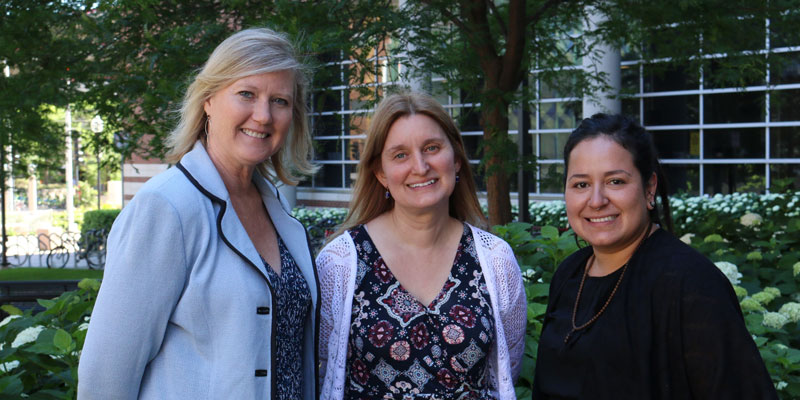New study looks at ways to improve student success for non-native English speakers.

For students whose first language is not English, understanding some of the complexities of subject matter in college courses can be challenging. But a recent study points to a few key ways instructors can help build confidence for Asian English language learners.
In particular, the research team, led by Beverly Smith-Keiling, teaching assistant professor in the Department of Biochemistry, Molecular Biology and Biophysics, found that having peers and instructors review and discuss drafts of low-stakes papers before completing larger papers in a biochemistry lab course helped increase confidence and success for non-English speaking students. Former CBS undergraduate Lidia Swanson and Joanne Dehnbostel, a graduate of CBS and current graduate student in Public Health were co-authors of the paper, which was published in the Journal of Microbiology & Biology Education.
We recently caught up with Smith-Keiling, Dehnbostel and Swanson, herself a non-native English speaker and soon-to-be BMBB graduate student, to learn more on their findings.
What is the most beneficial element, in your mind, of your findings for helping students succeed in the classroom?
Beverly Smith-Keiling: Peer discussion can increase social support. With peer evaluation of writing, it helps build skills not only for the receiver, but also the reviewer who uses their own critical thinking. The peer evaluation aspect of communicating scientifically helped all students, but non-Native English speakers particularly benefited. Also, being able to examine writing using a software tool that measures their underlying cognitions, we could detect which students were struggling more with switching between English and their native language while we assessed their scientific writing. We were also able to ask them directly what support helped them most and measure changes in their confidence.
What motivated you to do this research? How was this useful for you as a student and researcher?
Lidia Swanson: As a non-native speaker, I was interested in understanding the challenges non-native speakers experience in scientific writing compared to native speakers. I was curious about how that affected their grades. This also allowed me to reflect on my personal experiences through my education.
This research was especially relevant as I was planning to pursue graduate school and I would one day be grading someone’s writing. I was interested in learning how I could best support students as a future graduate assistant, and this was a great opportunity for that.
Joanne Dehnbostel: I was happy to obtain experience with data analysis in a study that was geared toward encouragement and support of students.
What are the key takeaways about working with ELL students?
Smith-Keiling: We should encourage students to think and write in English. While most of our upper-level students have already stopped relying on translator programs to write, this is good advice for our early students as they write. We can build writing exercises to support students in a writing course and encourage them to get lots of practice, but it really takes this type of practice over a long time period. By educators recognizing the challenges, we can help with peer partners, practice exercises, writing centers etc., but also encourage students to keep working at it and that it takes time.
What would you hope is the next step in this research?
Smith-Keiling: Since our focus was on one demographic of Asian English language learner students, we would have liked to see how non-Asian students who have either English as a second language or grew up with English in school but spoke other languages at home could benefit, but in order to have statistical power, we still need to have higher numbers included. Over time, perhaps we can look at these other underrepresented students more and if these strategies also help them more.
Also, since support services on campus are helpful for non-native English speakers, but still not sufficient for an immediate change, perhaps we can look at what more can be put into place to support not just writing in English, but writing scientifically using the English language.